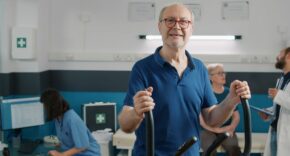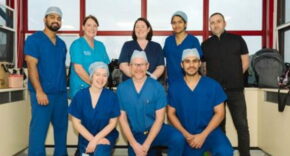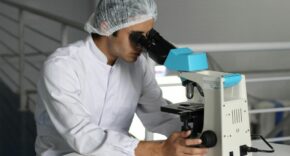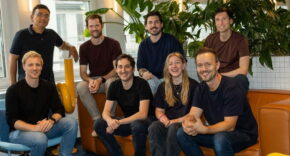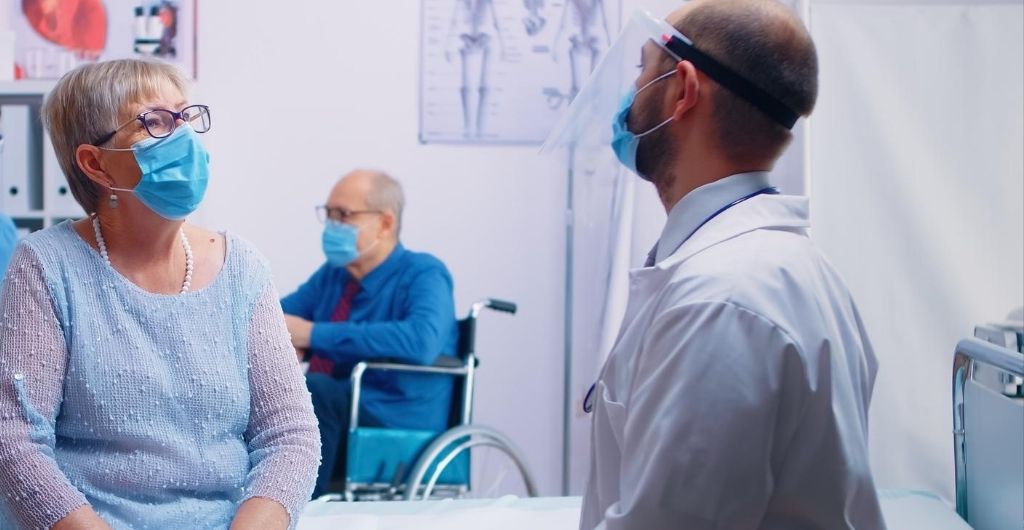
- O2 launches COVID-19 clinic-on-wheels in partnership with the University of Glasgow
- Connected Mobile Health Clinic provides remote testing and tracking of care home residents and workers in Glasgow
- Three-month trial will inform wider rollout across Scotland for remote diagnostics, health management and tele-consultation through the NHS
The University of Glasgow’s Adam Smith Business School and James Watt School of Engineering, and O2’s Darwin Innovation Group have been working in collaboration to create a proof-of-concept COVID-19 Connected Mobile Health Clinic (CMHC) that can be used in the trial.
Starting this summer, the trial will track COVID-19 at six care homes in Glasgow, capturing the data of 550 residents and care home workers over three months. The trial has been created to assess the area that one mobile testing unit can cover, in order to roll it out across the West of Scotland Region, where there are around 2.7 million patients that the mobile clinic could assist.1
The CMHC will share the number of COVID-19 tests performed and the results to a secure cloud server via O2’s mobile network, which covers almost 99% of Scottish premises, 95% of which through 4G. The testing unit will then provide a dashboard of real-time epidemiological analysis to the NHS, the Scottish Government and public health organisations. The project management team will also be able to track the vehicle’s position and behaviour and monitor the number of tests it’s carrying in its inventory to keep it running effectively.
The CMHC is designed to minimise exposure of care home residents and staff to COVID-19, thereby ensuring greater efficiency for healthcare workers and enhancing the testing capability of the NHS.
The project was created in response to an open request for help from the Scottish Government in March to fight COVID-19. With healthcare professionals currently overstretched, the CMHC aims to provide an innovative solution that factors in the distinctiveness of care homes in managing this outbreak.
The project will be used by the NHS to develop policy implementations and social business models to support its COVID-19 epidemic strategy. The scaled model will also be useful in future for remote diagnostics, health management and tele-consultation for the NHS, since vehicles will be equipped for both terrestrial and satellite communication, allowing for testing in the remotest areas of Scotland.
The project is co-funded by O2’s Darwin Innovation Group and the University of Glasgow’s EPSRC Impact Acceleration Account. It is part of Project Darwin, a four-year trial programme and partnership between O2 and the European Space Agency designed to develop and validate the next generation of connectivity solutions for connected and autonomous vehicles.
In March, O2 officially opened a new Darwin laboratory at the University of Glasgow alongside the European Space Agency. The laboratory is designed to develop proof of concepts for the next generation technology convergence needed for connected autonomous vehicles.
Derek McManus, Chief Operating Officer at O2 said: “We’re delighted to be supporting this project with our 4G and 5G network to help the Scottish Government and NHS tackle and manage COVID-19. The Darwin laboratory in Glasgow was only officially opened at the start of this year and it’s exciting to be able to show so quickly how we can use innovations in 5G technology to unlock crucial solutions for society and revolutionise the way we use mobile connectivity.
“O2 is at the forefront of connectivity which is now one of the UK’s most valued services. As we look to rebuild Britain, we are constantly looking at how our customer-centric networks can help support this country.”
Professor Nuran Acur, University of Glasgow Adam Smith Business School said: ‘’Resilience will become the new buzzword for care homes during COVID-19 epidemic. Our project will enhance care homes resilience for COVID-19-related cases by designing the interface of proven digital technology, Connected Mobile Health Clinics and a new, social business model for linking key players such as the NHS, care homes and technology providers in the health ecosystem.”
Professor Muhammad Imran, University of Glasgow James Watt School of Engineering said: “The utility and scope of a mobile health clinic goes beyond this current pandemic. Engineering a fleet of connected healthcare response mobile units can provide services at the doorsteps of fragile and constrained patients all over the country even after the pandemic is over.”
Janice Allan, Clinical Director at Pacific Care said: “We are currently carrying out staff tests weekly and the process can be arduous, since we are dependent on scheduling of deliveries and collections, packaging and labelling – this is all valuable time away from resident care. For Pacific Care a mobile testing centre could streamline this process, and when antibody screening is available it will be a helpful diagnostic tool to enable us to test our staff and prepare in case there is a second wave in the winter.”








